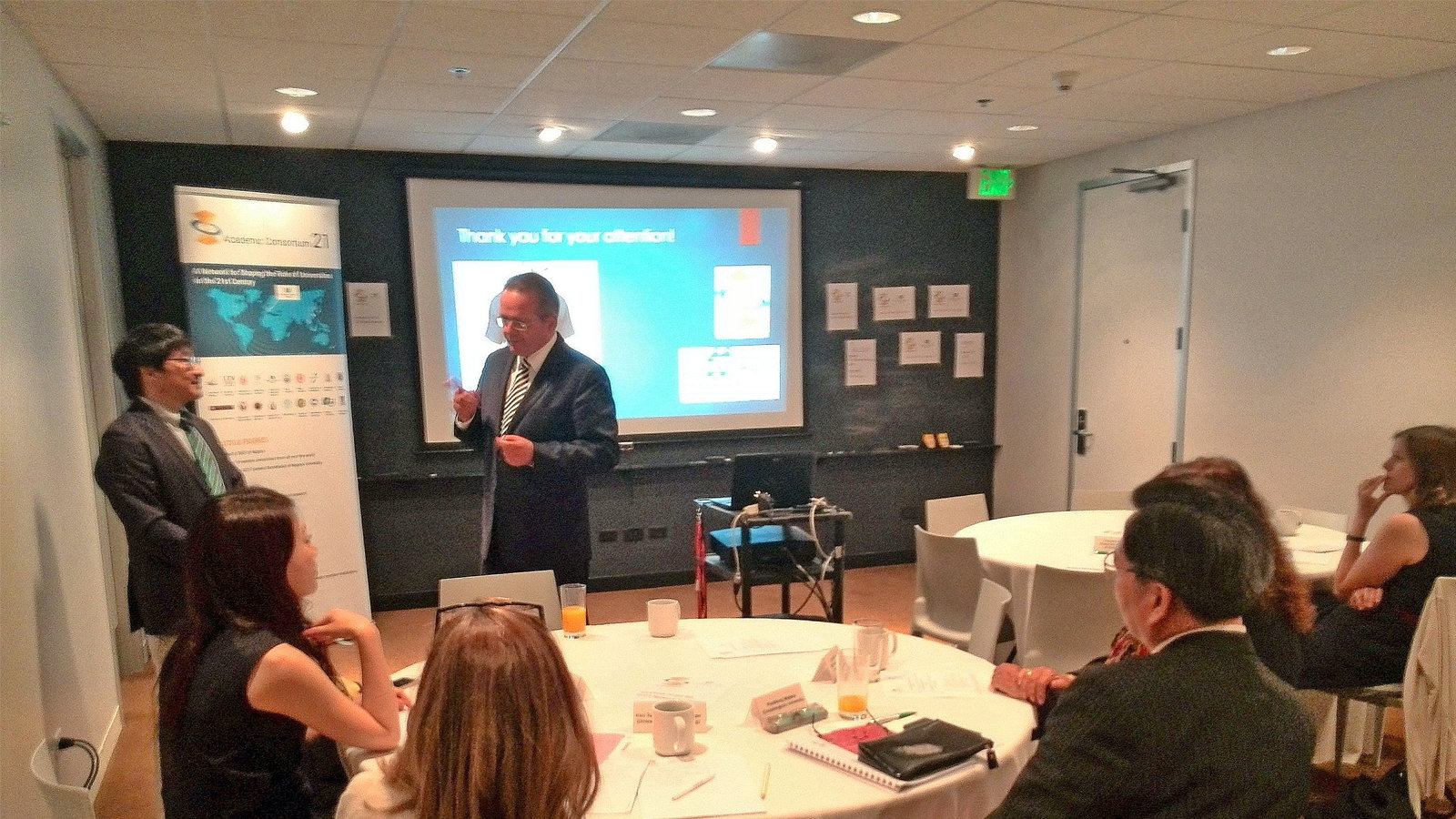Best Practice for high-level networking
AC21 Networking Meeting organized by Chemnitz University of Technology on the occasion of the NAFSA held for the 9th time on 30 May 2017 at Los Angeles
-

Eberhard Alles, Chancellor and AC21-Communicator of Chemnitz University of Technology, opened the meeting. Photo: private
The roots go back until the year 2009: At this year, the 1st AC21 Network Meeting was organized by Chemnitz University of Technology on the occasion of the NAFSA Conference & Expo as an event for bringing together representatives from AC21-member universities in order to present best practices and discuss opportunities for the further development of the AC21-network in-between the main AC21-events. As this format was very much appreciated and successful, it became a well-practiced tradition and was since then held every year.
This year, the AC21 Network Meeting happened already for the 9th time. On 30 May 2017, representatives from Chemnitz University of Technology, Nagoya University, North Carolina State University, Chulalongkorn University, the University of Strasbourg and the University of Canterbury met at Los Angeles.
The meeting was opened by the Chancellor and AC21-Communicator of Chemnitz University of Technology, Eberhard Alles, who welcomed the participants and gave an outlook on the upcoming AC21 International Graduate School 2019 hosted by Chemnitz University of Technology. The chancellor underlined the fact that the overall theme of this event, “Technologies for Resource-efficiency”, perfectly meets the research key areas and strengths of the university. A central role within this event will be dedicated to the Federal Cluster of Excellence “Merge Technologies for Multifunctional Lightweight Structures (MERGE)” as the one and only cluster in Germany on the future-oriented field of lightweight engineering with a strong focus on internationalization.
The MERGE-cluster was also in the center of the presentation of Prof. Dr. Cornelia Zanger, professor for marketing at Chemnitz University of Technology, who talked about ways on “how a university establishes successful industrial collaborations – insights and best practices for research and teaching at Chemnitz University of Technology”. The “secret of success”, Prof. Zanger emphasized, consists on the creation of “win-win-partnerships” where both, the university and the company, take advantages of the collaboration.
Additionally, the participants of the meeting were introduced to the research strategy of the Chulalongkorn University by its Vice-President for Academic Affairs, Dr. Pomthong Malakul Na Ayudhaya. With the vision of becoming a “world-class university that generates knowledge and innovation necessary for the creative and sustainable transformation of Thai society”, Chulalongkorn University developed a strategy bringing together a top-down positioning on four research key areas (aging society, sustainable development, inclusive community and smart city, digital economy and robotics) with a bottom-up-forming of cross-discipline research groups and projects within these key areas.
Subsequently, Prof. Jiro Takai from the School of Education and Human Development of Nagoya University was discussing the question if the national strategy “Japan’s Top Global University is really working”. He explained that with the objective of placing 10 Japanese universities within the top 100 in global rankings, the Japanese government developed a program of reinforcing internationalization at selected universities with high potential, underneath them Nagoya University, and came to the result that the universities could progress even faster on their way to world-class if they would be dedicated additional resources for reaching this goal.
Finally, the University of Strasbourg was presenting “5 centuries of excellence” going back until the founding year 1538. The audience learned that the special strengths of the University of Strasbourg consist on an exceptional diversity of degree programs, on outstanding research performances with alone 4 nobel prize winners within the last six years as well as strong international networking activities, underneath them AC21.
In resume, the AC21 Network Meeting 2017 proved once again that one of the main success factors of a vivid network is to bring together representatives of the members in order to exchange information about national strategies and programs, to get an insight into individual profiles and recent activities of the member universities as well as to explore ways on how to make use of them for the benefit of the AC21-network and its member universities. Also this year, the AC21 Network Meeting has provided these results so that without exaggeration it can be concluded that it was once again a great success. (Dr. Wolfgang Lambrecht)
Matthias Fejes
28.06.2017
- Naturwissenschaften
- , Mathematik
- , Maschinenbau
- , Elektrotechnik und Informationstechnik
- , Informatik
- , Wirtschaftswissenschaften
- , Philosophische Fakultät
- , Human- und Sozialwissenschaften
- , Universitätsrechenzentrum
- , Universitätsbibliothek
- , Zentrum für Lehrkräftebildung und Bildungsforschung
- , Studierende
- , International
- , Wirtschaft




